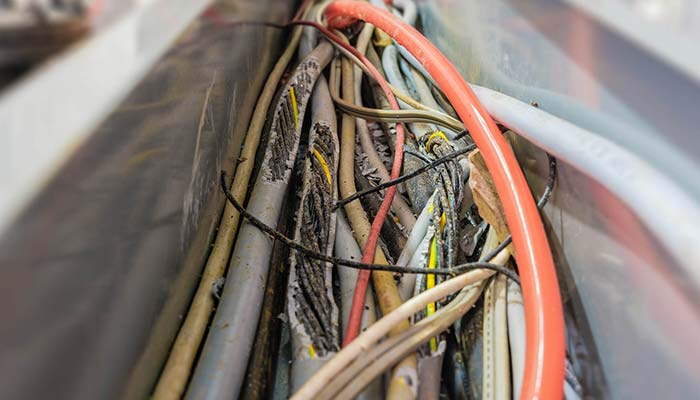Water and electricity don’t mix, and when electrical wiring is water damaged, the results can be dangerous and potentially life-threatening. Understanding the effects of water damage on electrical wiring and what to do if you experience this issue can help keep you and your home safe.
Water damage to electrical wiring can cause a range of problems, from short circuits and sparking to complete electrical failure. When water comes into contact with electrical wires, it can cause a short circuit, which is a flow of electricity that jumps from one wire to another, causing sparks and potential fires. In addition, water can damage the insulation on the wires, which can cause the wires to become exposed and create a shock hazard.
Another problem with water-damaged electrical wiring is that it can cause the wiring to become corroded. Corroded wiring can create a fire hazard and can also lead to electrical failure, making it impossible to use the electrical system in your home. In addition, corroded wiring can also cause a significant drop in the electrical system’s performance, making it difficult to power appliances and electronics in your home.
Water damage to electrical wiring can also have negative effects on your home’s electrical system as a whole. For example, if water enters an electrical panel, it can cause the breakers to trip, shutting off power to your home. In some cases, water damage to an electrical panel can also cause it to short circuit, creating a fire hazard.
In the event of water damage to electrical wiring, it’s important to take immediate action to prevent further damage and potential hazards. If you experience water damage to electrical wiring in your home, turn off the power to the affected area and call an electrician for repairs. Never attempt to make repairs yourself if you’re not trained and qualified to do so, as this can be extremely dangerous and put your life and the lives of others at risk.
To prevent water damage to electrical wiring, it’s important to keep electrical systems and appliances away from water sources, such as sinks, toilets, and showers. In addition, it’s important to make sure that electrical panels are located in areas that are protected from water damage, such as a dry and well-ventilated location. If you’re installing a new electrical system, consider installing waterproof outlets and panels to help prevent water damage.
In conclusion, water damage to electrical wiring is a serious issue that can cause a range of problems, from short circuits and sparking to complete electrical failure. To protect your home and your family, it’s important to take steps to prevent water damage to electrical wiring, and to take immediate action if you experience this issue. By working with a qualified electrician, you can help ensure that your electrical system is safe and reliable, and that your home is protected from the dangers of water damage.

